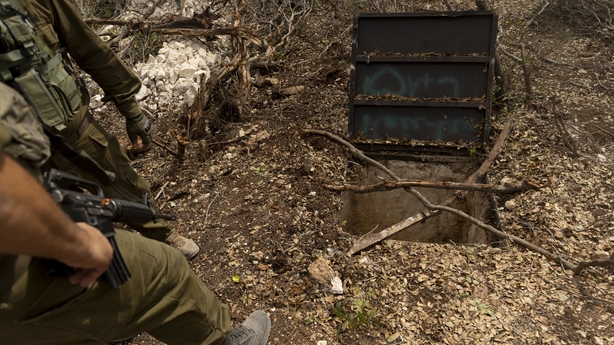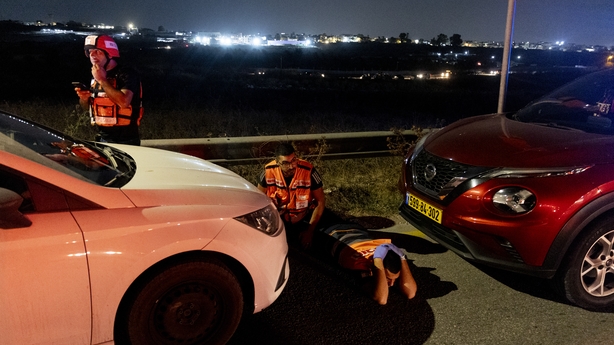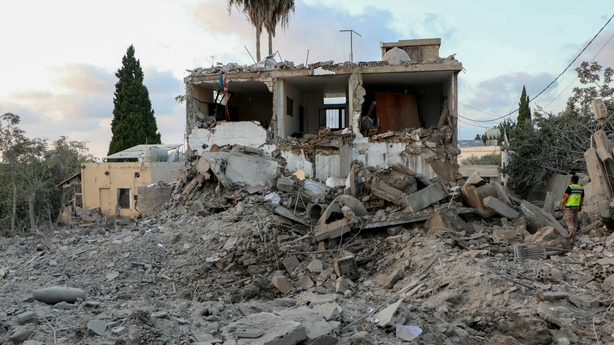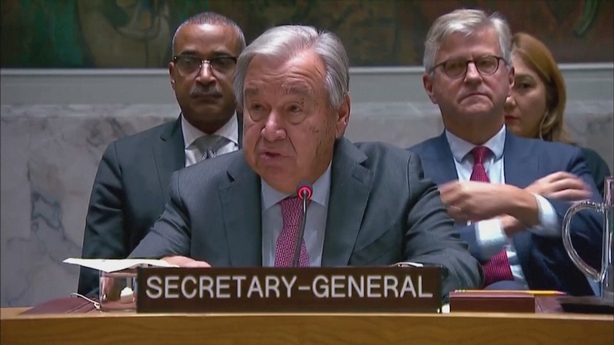Israeli Energy Minister Eli Cohen has accused the United Nations' UNIFIL peacekeepers in south Lebanon of being a "useless" force that failed to protect Israelis from Hezbollah attacks and called on it to withdraw as fighting ramps up.
"The State of Israel will do everything to ensure the safety of its citizens, and if the UN cannot help, at least it should not interfere, and move its personnel from the combat zones," he said on X.
Israel and the United Nations have been trading accusations over the peacekeepers in south Lebanon, as Israel pushes its forces through the area in an attempt to wipe out Iran-backed Hezbollah and its military infrastructure.
The UN said Israeli tanks had burst into its base yesterday, the latest allegations of Israeli violations against peacekeeping forces, that have been condemned by Hezbollah and by Israel's allies.
Israel disputed the UN account and Israeli Prime Minister Benjamin Netanyahu called for the peacekeepers to withdraw, saying they were providing "human shields" for Hezbollah.
The UNIFIL peacekeeping force said two Israeli Merkava tanks destroyed the main gate of a base and forcibly entered before dawn yesterday. After the tanks left, shells exploded 100 metres away, releasing smoke which blew across the base and sickened UN personnel, it said in a statement.
In a statement, the Defence Forces said Irish personnel on peacekeeping duties in Lebanon were all safe and accounted four.
The Israeli military took foreign journalists into southern Lebanon and showed them a Hezbollah tunnel shaft that was less than 200 metres away from a UNIFIL position, as well as weapon stashes that the troops found.

Brigadier General Yiftach Norkin said the tunnels were built a few years ago.
Since announcing its ground operation near the border, the Israeli military says that it has destroyed dozens of Hezbollah tunnel shafts, rocket launchers and command posts.
Hezbollah possesses an extensive tunnel network in southern Lebanon, both the group and Israel say.
Meanwhile, European Union foreign policy chief Josep Borrell said EU member states have taken too long to condemn Israel's attacks on UNIFIL soldiers in Lebanon, describing the attacks as "completely unacceptable".
Israel's military has said a Hezbollah drone killed four soldiers at one of its northern bases last night.
The attack on a military training camp in Binyamina, near Haifa, was the deadliest such assault on an Israeli base since 23 September, when Israel increased its attacks on Hezbollah in Lebanon. Emergency services reported more than 60 wounded.
Authorities in Gaza, meanwhile, said the death toll from an Israeli strike on a school being used as a shelter for displaced people had risen to 15, including whole families, while a separate overnight strike on a hospital killed four.

In a statement, Hezbollah warned Israel that "what it witnessed ... in southern Haifa is nothing compared to what awaits it if it decides to continue its aggression against our noble and dear people".
An Israeli volunteer rescue service, United Hatzalah, said its teams in Binyamina assisted "over 60 wounded people" with injuries ranging from mild to critical.
Read more:
Live: Updates as they happen
Latest Middle East stories
Hezbollah has been firing rockets and drones into Israel for more than a year in support of Hamas militants in Gaza.

Since late September, however, its strikes have reached further into the country.
Israel's sophisticated air defences have intercepted most of the projectiles, with few casualties caused by strikes or falling debris.
Israel's recent strikes have increasingly focused on areas beyond what are believed to be Hezbollah's traditional strongholds in southern Beirut, and Lebanon's south and east.
Israel said its air force hit "Hezbollah launchers, anti-tank missile posts, weapons storage facilities" and other targets, while on the ground its soldiers "eliminated dozens" of fighters.
Lebanon's official National News Agency said Israeli forces had "escalated their attacks" on southern Lebanon with "successive air strikes" pounding several border villages.
It later reported that an Israeli strike on Mayfadoun, near Nabatiyeh, in southern Lebanon, had killed five people and wounded one other.
Hezbollah said its forces clashed several times with Israeli troops who tried to "infiltrate" villages along the border.
Before the drone strike it had said it launched a salvo of rockets at a "base in southern Haifa".
The group later aired an audio recording of its assassinated leader Hassan Nasrallah calling on fighters to "defend this holy and blessed land and this honourable people".

Nasrallah was killed in an Israeli air strike in south Beirut on 27 September, and several other senior commanders of the movement have also been killed.
Israel's military said about 115 projectiles fired by Hezbollah had crossed into Israeli territory by yesterday afternoon.
A Hezbollah fighter was captured yesterday emerging from a tunnel in south Lebanon, Israel's military said, the first such announcement since the start of the ground offensive.
Israeli strikes in Lebanon have killed more than 1,300 people since 23 September, according to an AFP tally of official figures, including yesterday.
That toll exceeds the entire Lebanese toll of 1,200, mostly civilians, in the last Hezbollah-Israel war in 2006, when 160 people, mostly soldiers, died in Israel.
The Pentagon said it would deploy a high-altitude anti-missile system and its US military crew to Israel to help the ally protect itself from potential Iranian attack.

